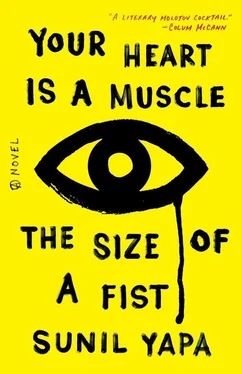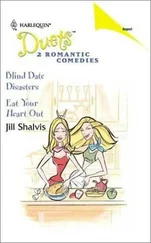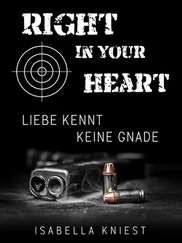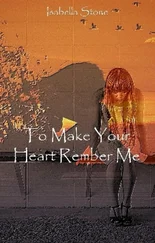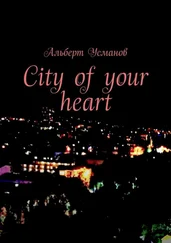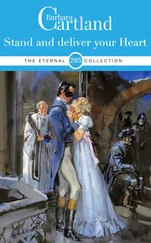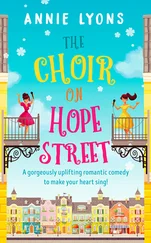“How many, man?”
“All of them I suppose.”
“And do they trust you?”
At this Martin paused again. He regarded Charles for a moment and then said, “Yes, they do.”
“Good. We need to get them together.”
“What are you planning to do with that?” Martin gestured toward the folder with his eyes.
The TV didn’t show their conversation, these two economic ministers of small Third World nations, Charles talking, Martin nodding, the two of them suddenly laughing, nor the new light which gathered in their faces as they stood up, nor the embrace they shared there in the restaurant that had a solidity to it which had not been present in some forty years, these oldest of friends, these newly minted comrades. Charles clapped Martin on the back and together they made their way to the elevator.
Charles hit the street, holding the folder and thinking he wasn’t just going to refuse their offer. No, he was going to shut down the entire round of meetings and make sure they didn’t start until they started on fair terms. Just as he had once flown the world gathering signatures, now he was going to gather people. He was going to gather enough of the African ministers, the Latin American ministers, the Asian ministers, and together they were going to make the meetings fair and transparent. Environmental regulations. Labor laws. These would be included, or the meetings would not continue. What was it he had heard in the street so many times today? Fair trade, not free trade. Well the big boys — the developed countries — couldn’t have either, if none of the former colonies agreed to participate. No factories for their clothes, no mines for their minerals, no markets for their subsidized rice and corn. Nobody to trade with, if that’s what you wanted to call it. Charles was going to make sure they didn’t go another round. He straightened his suit and stepped from the back door of the Sheraton. He looked down the block to where those city buses were parked. But first he was going to get some people out of jail.
John Henry had watched the bullet throw King in the street like a doll made of rags and sticks. Her legs kicked out from the force of the blow, and he watched her, King, his friend and lover, bent into a geometric construction of body he would have never thought possible and John Henry thinking of the anti-nuke demo where they had first met, thinking about the desert, about the gate guards, and the scientists, and the regular staff. The janitor that wore a blue zip suit and a radiation badge and made, like, seven bucks an hour. Quiet John Henry and rage-filled King, how many years ago, and the janitor that brought them water there in the desert, tipping it to their mouths because they could not use their arms; telling them how everyone was talking about these eight crazy people chained together in front of the facility, how nobody in the entire place knew what to do — geniuses and generals alike — and John Henry remembering how King’s face had burned, how they had sat together for five days without food; how their lips had cracked and split as they grinned in dusty lockdown, how the janitor who watched from behind the chain-link fence had started crying and could not stop until he had left the confines of the fence and brought them the little plastic pail of water, turning it to their swollen mouths in the heat and the light.
But that was not what John Henry remembered most. What he remembered most was that man telling him how they had looked like corpses out there. How they scared him. How he looked at them, eight sitting corpses turning to mummies in the desert heat, and knew that he would never work in this facility again. How he could not continue, not after seeing their bodies like that. And how King leaned from the truck, leaned into the desert air, and kissed the man gently on the cheek and said, “Thank you.”
John Henry thinking how King was unafraid of fire because made of fire herself. And the lights of the ambulance trying to push its way through the intersection. And the stretcher which they slid beneath her and dropped the wheels, the stretcher to roll her to the vehicle when it could not make its way through the crowd.
And John Henry moving now, too, moving toward the PeaceKeeper. The noise of the people that remained rising to a nearly unbearable pitch. My people. Moving toward the cops stationed there, toward the black patch of paving that stood at their feet. My people. And John Henry knew he could not save King, already taken away on that stretcher, and he could not save Victor, who was still on the ground surrounded by angry sweating cops and their batons, Victor a small thing lost in that circle of rage, so John Henry knelt. Kneeling because he could not save King, praying because he could not save Victor. Lying down in front of the PeaceKeeper because if he could not save them, then he could join them.
John Henry stretched out, his head against the cool concrete, his single human body at the foot of the cops, his body on the ground in front of their slow-rolling machine. And they could move him, they could beat him, they could spray him or gas him or cuff him or kick him, but for now, for this one moment, as long as it lasted, he would lie right here on the city’s bloodied ground — one man alone — and he would breathe and not be moved.
Out of the chaos, he heard a groan. Not a sound of pain, but something familiar, a sound from his childhood, from a million dinners with his family and his father, it was the easy familiar groan his father made lowering himself to his chair, and John Henry looked up to find an older black man easing himself down onto the pavement, creaking and groaning, yes, as he lowered his body to the ground, his hand raised to his wife, who was on one knee, and then, too, lowering herself to the pavement beside the two of them.
Their three bodies stretched side by side on the pavement. Breathing evenly. The man reaching for John Henry’s hand. His dusty dry fingers so surprisingly strong.
The TV didn’t show Bishop in the swarm of cops, trying to throw them off with little success. Didn’t show his face or his body or his baton which he would not use. Pulling at men with his hands, nothing but his hands, while they hammered at his son.
And the TV didn’t show Ju atop the PeaceKeeper. Her tired feet, or the familiar ache in her lower back, or how she wanted nothing more than to go home and see her sister’s kids, let them play xylophone on her tired spine, except that they were in Guatemala, four thousand miles to the south, on the wrong side of two borders, and here she was geared up for civil war and she had just shot someone, discharged her weapon in the course of duty, which was legal and allowable and exactly what she was trained to do, except she had realized as soon as the gun fired and she saw the woman’s body crumpling in the street that legal or not she wanted nothing to do with it. That wasn’t the job.
But then, time went a little funny and when she looked in the street, she didn’t see the girl. What she saw were bodies. Bodies upon bodies lined side by side. More lying down with every passing moment. People lying in the street like corpses, head to toe, and arm to arm. Bodies clothed in blue and red and green. From her vantage point there atop the PeaceKeeper, what Ju saw were human bodies lying in the street as far as the eye could see. A line of corpses from here to the horizon line. The smoke drifting lazily over them, bright where it passed beneath the streetlamps. The black buildings reflecting faces without names, bodies whose families would never know, and soon the priest would come, soon the words would be said which closed one door forever and opened another. Soon the mothers would come, clutching photos to their chests, come to look one last time for what they knew was here but could not find. Then, finally, the cupped hand throwing dirt. The sharp grunt of the shovel in stony soil. Then the grass. Then the cold morning dew which did not care. Then the daisies growing in white bunches from their bellies, flowers in yellow from the new earth of their eyes and hands and mouths.
Читать дальше
